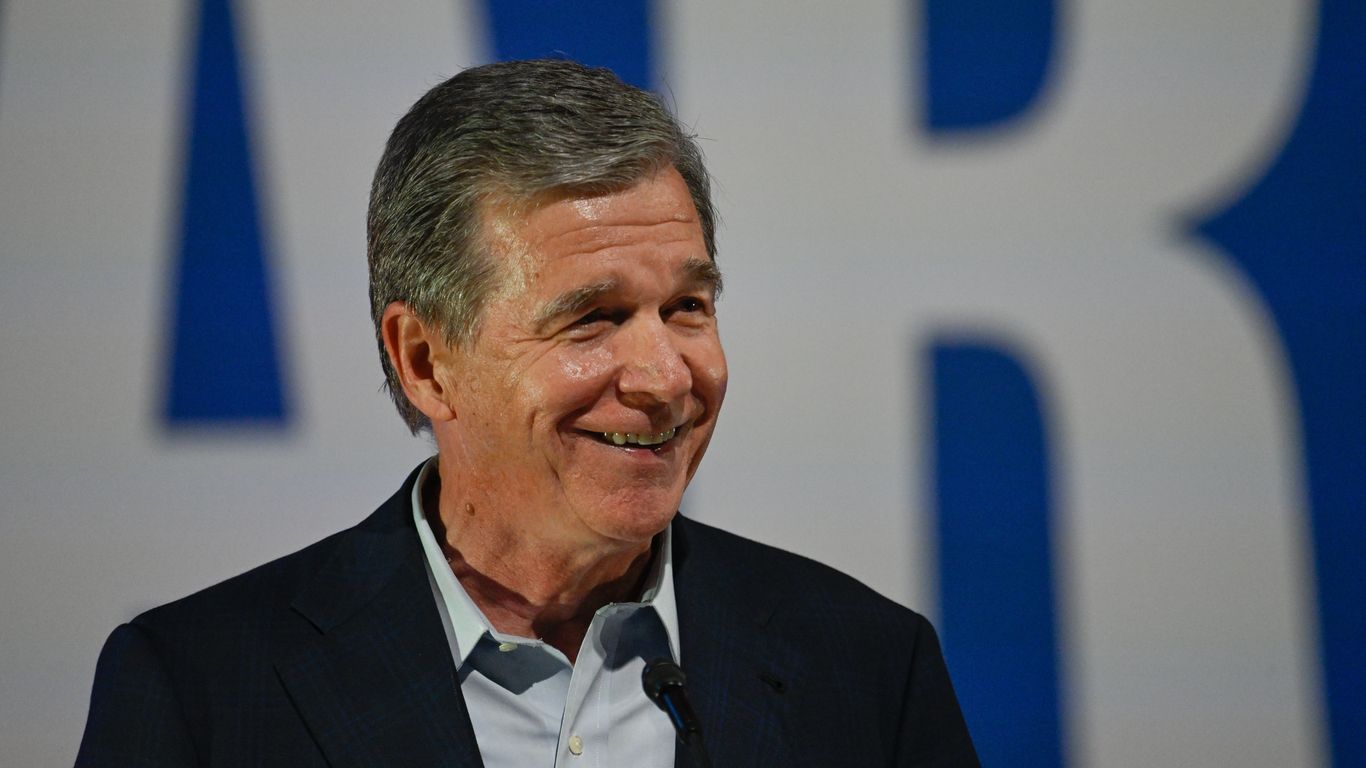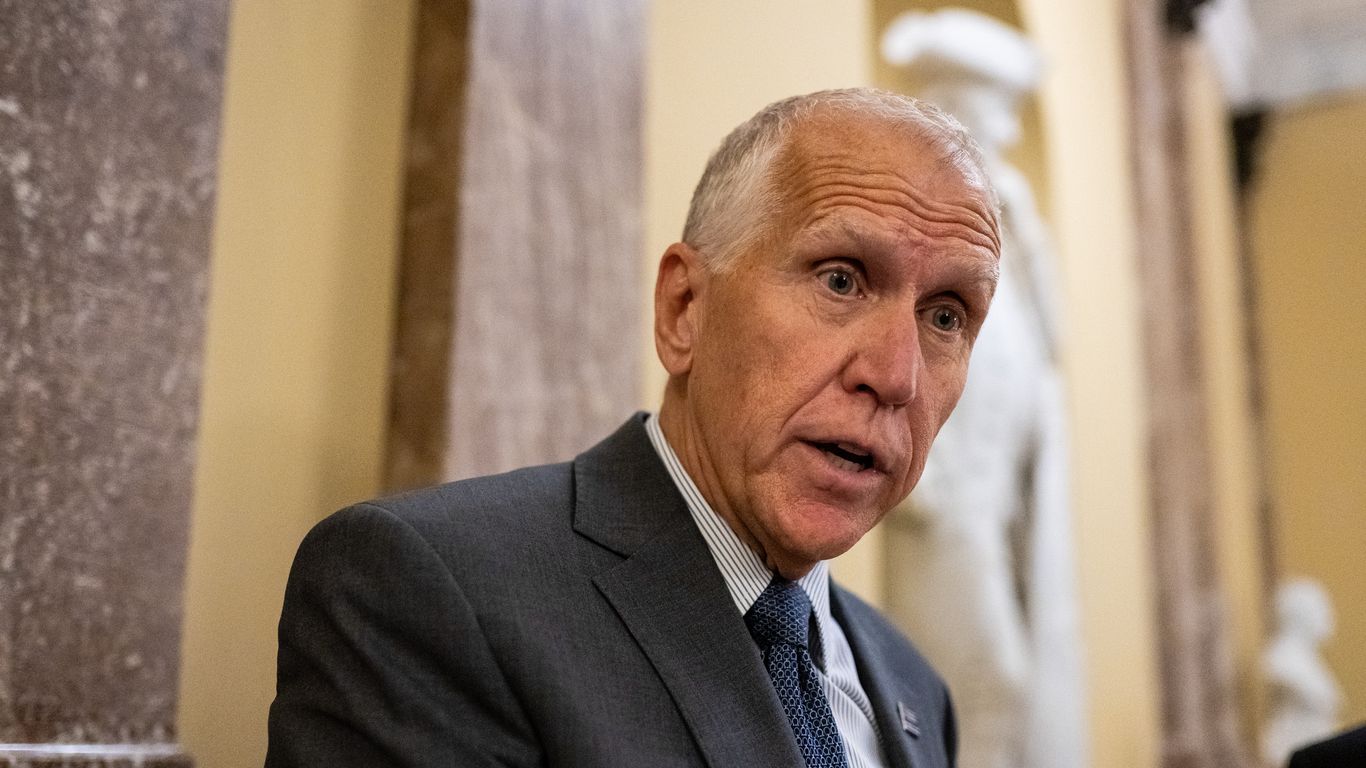North Carolina Senate Race: Cooper vs. Trump Showdown?

Scoop: Roy Cooper Leans Toward N.C. Senate Bid, Potential Trump Showdown
In the world of politics, timing is everything. And with the 2022 midterms just around the corner, potential candidates are starting to make their moves. One name that has been making headlines recently is North Carolina Governor Roy Cooper, who is reportedly considering a bid for the Senate seat currently held by Republican Richard Burr.
Background
The field for the North Carolina Senate race has been relatively quiet, with no major candidates announcing their intentions to run. However, with Burr's retirement announcement, the seat has become a prime target for both parties. On the Republican side, there are already several contenders, including former Governor Pat McCrory and current Congressman Mark Walker. On the Democratic side, there has been speculation that Cooper may throw his hat in the ring.
Current Scenario
According to Axios, Cooper has been leaning toward a Senate bid, but is waiting for a few key factors to fall into place. One of those factors is the decision of Lara Trump, daughter-in-law of former President Donald Trump, who has also been considering a run for the seat. If Lara Trump decides not to run, it could clear the way for Cooper to make his move. However, if she does decide to run, it could set up a potential showdown between Cooper and the Trump family.
This potential matchup has caught the attention of both parties, with Republicans hoping to use a Trump candidacy to energize their base and Democrats hoping to capitalize on the unpopularity of the former president. But regardless of who ultimately enters the race, one thing is clear: the North Carolina Senate seat is up for grabs and both parties will be fighting hard to claim it.
The Bigger Picture
The North Carolina Senate race is just one piece of the puzzle in the larger political landscape leading up to the 2022 midterms. With the Democrats holding a slim majority in the Senate, every race will be crucial in determining the balance of power in Congress. And with the potential for a Cooper vs. Trump showdown, this race has the potential to be one of the most closely watched and hotly contested races of the election.
As the midterms draw closer, all eyes will be on potential candidates like Roy Cooper and Lara Trump, and their decisions will have a major impact on the outcome of the North Carolina Senate race. Whether Cooper ultimately decides to run or not, one thing is for sure: this race will be one to watch as the political drama unfolds in the coming months.
About the People Mentioned
Roy Cooper
Roy Cooper is the 75th Governor of North Carolina, serving since January 2017. Born and raised in Nash County, North Carolina, he attended public schools and worked on his family farm before earning undergraduate and law degrees from the University of North Carolina at Chapel Hill. Cooper practiced law in Rocky Mount, NC, for 18 years. His mother was a public school teacher, which influenced his strong commitment to education[1][2]. Cooper began his public service career in the North Carolina House of Representatives in 1986 and later served in the State Senate, where he became the Democratic Majority Leader in 1997. During his legislative tenure, he advocated for increased teacher pay, reduced class sizes, and authored North Carolina’s first children’s health insurance initiative. Notably, as Senate Majority Leader, he led the passage of the pioneering 1999 North Carolina Predatory Lending Law, aimed at protecting homeowners from unaffordable loans[1][2][4]. In 2000, Cooper was elected Attorney General of North Carolina, a position he held for four terms until 2017. As Attorney General, he focused on family protection, crime reduction, consumer advocacy including fighting predatory lenders, and lowering utility rates[1][4]. As governor, Cooper has prioritized public education, economic development, rural revitalization, health care access, and disaster recovery after hurricanes. He successfully championed Medicaid expansion in North Carolina, which is considered a major policy achievement. Cooper also oversaw bipartisan efforts on energy policy, including legislation to reduce carbon emissions by 70% by 2030 and achieve carbon neutrality by 2050. He has appointed the most diverse cabinet in state history and worked to ensure government reflects the state’s demographics[1][7]. Cooper’s leadership has been marked by working with a legislature often controlled by the opposition party, navigating political challenges to advance his agenda focused on improving the welfare and prosperity of North Carolinians[7].
Richard Burr
Richard Mauze Burr is an American politician born on November 30, 1955, in Charlottesville, Virginia. He spent much of his childhood in Winston-Salem, North Carolina, where his father served as a Presbyterian minister. Burr received his bachelor's degree from Wake Forest University in 1978 and worked for Carswell Distributing Company, rising to become a national sales manager over 16 years[2][5]. Burr's political career began when he was elected to the U.S. House of Representatives in 1994, representing North Carolina's Fifth District until 2005. He then served in the U.S. Senate from 2005 to 2023, representing North Carolina[2][6]. During his tenure, Burr played a significant role in shaping healthcare and life sciences policies. Notable legislative achievements include the 1997 FDA Modernization Act, the Pandemic All Hazards Preparedness Act, and the creation of the Advanced Research Projects Authority for Health (ARPA-H)[1]. After leaving the Senate in 2023, Burr transitioned into the private sector. He is currently the principal policy advisor and chair of DLA Piper’s Health Policy Strategic Consulting practice, providing strategic advice to life sciences and healthcare clients[1]. His experience and influence in healthcare policy continue to be relevant, particularly given his contributions to critical legislation during his time in public office. Burr's legacy in healthcare policy is marked by his leadership in the Senate Committee on Health, Education, Labor and Pensions (HELP), where he championed numerous transformative initiatives. His commitment to public service and his experience in both the House and Senate have established him as a leading authority in healthcare policy[1][3].
Pat McCrory
Pat McCrory is a prominent American politician known for his roles in North Carolina politics. Born on October 17, 1956, in Columbus, Ohio, McCrory was raised in Guilford County, North Carolina. He earned degrees in education and political science from Catawba College. McCrory's political career began as a city councilman in Charlotte from 1989 to 1995, followed by a record fourteen-year tenure as the 53rd Mayor of Charlotte from 1995 to 2009[1][3]. During his mayoralty, Charlotte experienced significant growth, becoming one of the fastest-growing cities in the U.S., with advancements in transportation, banking, energy, and manufacturing sectors[2]. McCrory also served on the United States Homeland Security Advisory Council from 2002 to 2006, a position he received through a presidential appointment by George W. Bush[1][3]. In 2013, McCrory was inaugurated as the 74th Governor of North Carolina, marking a significant shift in state politics as Republicans gained control of both legislative houses and the governorship for the first time since 1870[1]. As governor, McCrory implemented notable economic reforms, including historic tax cuts that reduced personal and corporate tax rates, contributing to a drop in the state's unemployment rate[1]. He also developed a 25-year transportation plan to connect rural areas with urban centers[2]. After leaving office in 2017, McCrory returned to the private sector. More recently, he has been involved in regional talk radio and has explored further political ambitions. Despite his past successes, McCrory has faced criticism and has been described as a "failed politician" by some, reflecting challenges in his political trajectory post-governorship[4]. Currently, he remains active in conservative politics, advocating for fiscal responsibility and patriotic leadership[5].
Mark Walker
Mark Walker is a name shared by several notable individuals across diverse fields, including politics, music, judiciary, and humanitarian work. Here are concise summaries of the most prominent figures named Mark Walker: 1. **Mark Walker (Humanitarian and Author)**: Graduating in 1971 from Western Colorado University, Walker dedicated 50 years to international humanitarian efforts. He served in the Peace Corps and worked with organizations such as CARE International, Food for the Hungry, Make-A-Wish International, and Rotary International, where he received the "Service Above Self" award. He was CEO of Hagar International, focusing on combating human trafficking. Currently residing in Arizona, he continues writing and leads the platform Million Mile Walker to share his work[1]. 2. **Mark E. Walker (U.S. Federal Judge)**: Born in 1967, Mark E. Walker serves as a United States district judge for the Northern District of Florida. He is noted for rulings involving voting rights, including ordering restoration of felons' voting rights post-incarceration and invalidating restrictions on early voting sites on college campuses in Florida. He has also ruled on cases involving transgender inmates and language access for Spanish-speaking voters[2]. 3. **Mark Walker (North Carolina Politician)**: Born in 1969, Walker is a former U.S. Representative from North Carolina and the youngest chairman of the conservative Republican Study Committee. His legislative record includes support for North Carolina's Public Facilities Privacy & Security Act ("HB2") and opposition to the Violence Against Women Act reauthorization. He has been an advocate for repealing the Affordable Care Act[3][8][9]. 4. **Mark Walker (Musician and Educator)**: A Grammy Award-winning drummer and percussionist from Chicago, Walker has performed worldwide with renowned jazz artists and appears on over 75 recordings, including multiple Grammy and Latin Grammy-winning albums. Since 2001, he has been an educator at Berklee College of Music, contributing to curriculum development and international workshops[4][5][7]. 5. **Mark Walker (Illinois State Senator)**: Serving in the Illinois General Assembly from 2009 to 2011 and 2019 to 2024, this Mark Walker is a Vietnam veteran and advocate for veterans and homeless individuals. With a background as a financial industry executive and management consultant, he has focused on small business reforms and economic development in Illinois[6]. Each Mark Walker has achieved distinction in his respective domain, with ongoing relevance through public service, law, humanitarian efforts, music, or politics.
Lara Trump
Lara Trump, born Lara Lea Yunaska on October 12, 1982, is an American television producer and political strategist. She is married to Eric Trump, the third child of former U.S. President Donald Trump. Lara's educational background includes a degree in communications from North Carolina State University, which she completed in 2005[2][4]. Following her graduation, she also pursued culinary studies, reflecting her diverse interests in both media and culinary arts[4]. Lara Trump began her career in television as a story coordinator and producer for the syndicated news-magazine show *Inside Edition* from 2012 to 2016[4][6]. She transitioned into politics during Donald Trump's 2016 presidential campaign, serving as a digital consultant and fundraiser[4]. Her involvement in the Trump family's political endeavors continued, and she became a regular contributor on Fox News[2][4]. In 2021, she started hosting her own show, *My View with Lara Trump*, further solidifying her presence in media[4]. In March 2024, Lara Trump was elected as the co-chair of the Republican National Committee alongside Michael Whatley, marking a significant step in her political career[2][4]. However, her tenure in this role was relatively short-lived, ending in December 2024[5]. Lara has been a prominent figure in the Trump family's political campaigns and has been involved in various events and initiatives, including the Trump-Pence Women’s Empowerment Tour[6]. Her current relevance in the political sphere is underscored by her ongoing involvement with the Republican Party and her continued appearances on media platforms.
Donald Trump
Donald John Trump, born June 14, 1946, in Queens, New York, is an American businessman, media personality, and politician. He graduated from the University of Pennsylvania’s Wharton School in 1968 with a degree in economics. In 1971, he took over his family’s real estate business, renaming it the Trump Organization, through which he expanded into building and managing skyscrapers, hotels, casinos, and golf courses. Trump gained widespread fame as the host of the reality TV show *The Apprentice* from 2004 to 2015, which helped establish his public persona as a successful entrepreneur. Trump entered politics as a Republican and was elected the 45th president of the United States, serving from 2017 to 2021. His presidency was marked by significant policy actions including tax cuts, deregulation, the appointment of three Supreme Court justices, renegotiation of trade agreements (notably replacing NAFTA with the USMCA), and a focus on immigration control including border wall expansion. He withdrew the U.S. from international agreements such as the Paris Climate Accord and the Iran nuclear deal, and engaged in a trade war with China. His administration’s response to the COVID-19 pandemic was criticized for downplaying the virus’s severity. Trump was impeached twice by the House of Representatives—first in 2019 for abuse of power and obstruction, and again in 2021 for incitement of insurrection—but was acquitted by the Senate both times. After losing the 2020 election to Joe Biden, Trump challenged the results, culminating in the January 6, 2021, Capitol riot. He remains a central figure in American politics, having won the 2024 presidential election and returned as the 47th president in 2025, continuing to promote policies aimed at economic growth, border security, and military strength[1][2][3][4].
About the Organizations Mentioned
Republican Party
The **Republican Party**, also known as the **GOP (Grand Old Party)**, is one of the two major political parties in the United States, founded in 1854 primarily by anti-slavery activists opposing the Kansas-Nebraska Act and the expansion of slavery into U.S. territories[1][5]. It was formed from a coalition of former Whigs, Democrats, and Free Soil party members who shared opposition to slavery and a desire for a national political force promoting economic development and social order[2][5]. The party's early base included northern Protestants, businessmen, factory workers, professionals, and prosperous farmers. It strongly supported pro-business policies like the national banking system, the gold standard, railroads, and high tariffs[1][3]. Abraham Lincoln, the first Republican president elected in 1860, led the party through the Civil War, championing the abolition of slavery and the preservation of the Union. This solidified the GOP’s dominance in national politics for decades, especially in the North, while it remained weak in the South[1][5][6]. Historically, the Republican Party was instrumental in major social reforms, including the Emancipation Proclamation and the passage of the 13th, 14th, and 15th Amendments, which abolished slavery, guaranteed equal protection, and secured voting rights for African Americans, respectively[6]. The party also supported women's suffrage early on, backing the 19th Amendment[6]. In the 20th century, Republicans were associated with both conservative economic policies—favoring reduced taxes, limited government regulation, and individual economic freedom—and a strong national defense[7]. The party experienced ideological splits, notably in 1912 when Theodore Roosevelt led a progressive faction away from the conservative wing[1][5]. Today, the GOP continues to promote conservative social policies and states’ rights, opposing extensive federal intervention and advocating free-market principles[7]. For readers interested in business and technology,
Democratic Party
## Overview of the Democratic Party The Democratic Party is the oldest continuing political party in the United States, with its roots tracing back to 1792 as the Democratic-Republican Party. Founded by Thomas Jefferson and James Madison, it initially advocated for a decentralized government and states' rights, opposing a strong central authority[1][2]. Over time, the party evolved, becoming more progressive and supportive of federal government intervention in social and economic affairs. ## History The modern Democratic Party was formally established in 1828, with Andrew Jackson's presidential campaign marking a significant turning point. Jackson's successful campaign expanded voting rights to all white men, regardless of land ownership, and further reduced federal power[3][6]. The party became deeply divided during the Civil War era, with Northern Democrats supporting limited slavery expansion and Southern Democrats advocating for its perpetuation[3][5]. Post-Civil War, the party became a stronghold for Southern whites who opposed Reconstruction[3]. ## Key Achievements The Democratic Party has played a pivotal role in shaping U.S. history: - **Civil Rights**: The party supported key civil rights legislation, including the Voting Rights Act and the Civil Rights Act of 1964. - **Social Programs**: Democrats have been instrumental in establishing and expanding social programs like Social Security, Medicare, and Medicaid. - **Economic Policies**: The party has often championed progressive economic policies, including labor rights and environmental protection. ## Current Status Today, the Democratic Party is a major force in U.S. politics, advocating for a strong federal government role in addressing social and economic issues. It emphasizes progressive policies on healthcare, climate change, and economic inequality[6]. ## Notable Aspects - **Symbolism**: The party's symbol, the donkey, originated from Andrew Jackson's opponents calling him a "jackass," which his supporters adopted as a mascot[6]. - **Diversity**: The party has become increasingly diverse, representing a wide range of socio-economic and
Axios
Axios is a dynamic media company founded in January 2017 by veteran journalists Jim VandeHei, Mike Allen, and Roy Schwartz, with a mission to transform how news is delivered in the digital age. Frustrated by the clutter, bias, and inefficiency of traditional media, the founders engineered Axios around a simple but powerful idea: deliver the clearest, smartest, and most trustworthy news experience for both audiences and advertisers. Axios quickly gained recognition for its concise, clinical reporting style—presenting facts without partisan opinion, and avoiding editorial pages or overt political endorsements. This commitment to neutrality and factual integrity has helped Axios build trust with readers seeking reliable, efficient news. Axios covers a broad range of topics including politics, technology, business, health, science, and sports, with a signature format that distills complex stories into digestible, bullet-pointed updates. The company’s approach has been praised for its reliability and balanced perspective, earning it a “Middle” bias rating and high marks for factual reporting from independent media analysts. Beyond its newsroom, Axios expanded into enterprise communications with Axios HQ, an AI-powered platform that helps organizations—from startups to Fortune 500 companies—craft clear, impactful internal communications. This innovation reflects Axios’s broader influence in shaping how information is shared in both media and business environments. Today, Axios remains a privately held company with a growing audience and a reputation for innovation. Its commitment to transparency, efficiency, and trust continues to set it apart in the crowded media landscape, making it a go-to source for professionals and organizations seeking smart, trustworthy news and communication solutions.

















